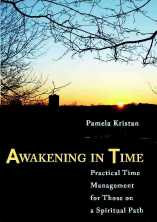I walked into
Pam Kristan's time management workshop in Jamaica Plain on January 30 feeling that I was already somewhat of an expert on time management. After all, I had successfully completed an MBA with honors while working full time while I had a two-year-old. I am somewhat of a time management aficionado, picking up tips from a wide variety of sources. So I was pleasantly surprised when I learned a huge amount from the two hours I spent at the workshop.
Pam's system revolves around the ABCs: attention, boundaries, and choices. She started off with a quick tip for us to deal with interruptions. She suggests that if someone interrupts you, pick a word so that you can return to that spot in your project, somewhat like a pause button.
As you might expect, she was very mindful with time, informing us how long she expected something to take, how long until a break, etc. this was useful for participants' planning purposes. I plan to apply this at home in the mornings with my daughter to better manage our morning time with a timer.
A highlight of the program for me was when Gabriel led the room in a guided meditation. I realized how much better I respond to a guided meditation than going it alone, so I found several good tracks by
Meditation Oasis that I've downloaded onto my phone to do each morning.
Pam left us with nuggets of wisdom around each of her ABCs. For example, when she discussed attention, she suggested a system of catch, distribute, and review. To put that in practice, when idea comes in, catch it by writing it down. Then, distribute it where you need it. Finally, in the review stage, assign this task to where it needs to go. You might add it to a calendar or a list, for instance.
Another wise suggestion regarding attention is that we each control our own attention. Sometimes, a bit of empowerment can allow us to feel more comfortable with a never-ending to do list. As she reminded us, our to do list is impossible to finish and never ends. She encouraged audience participation and suggestions, so I chimed in with my favorite to-do list,
Peter Bregman's six box to-do list. Pam stressed that different systems will work for different people, so do what works for your specific circumstances.
One of the most useful takeaways for me was a technique that Pam outlined as satisfaction reflection. She pointed out that most people rush through their days focusing on what they haven't done yet. Instead, she urged us to focus on what we
have accomplished rather than dwelling on what we have not. This is essentially optimism for time management, and as an eternal optimist, I'm drawn to the idea.
Pam suggested a timing your work using a block of 20 minutes, and 17 minutes in, closing the segment down. She suggested to first reflect on the past via a satisfaction practice and note down what was effective. Then, looking forward, identify your next steps. Finally, remain in the present. This reminded me of a working technique that I really enjoy, the
Pomodoro technique. Combined with the three-minute closing, I think it will be very effective in managing my competing priorities.
When establishing boundaries, Pam suggested that we consider a cell membrane and its semi-permeable nature. She suggested that rather than being completely rigid, that we allow for flexibility in terms of our schedule. This tip is especially good for the chronically late. Pam suggested thinking of both/and rather than either/or and finding creative solutions to accomplish more.
Pam led an interesting heartbeat tracking activity that drilled into attendees that it is very difficult to be in touch with your own agenda while paying attention to that of others. As a people pleaser, this one hit home for me very intensely. As part of my satisfaction practice, I set an intention for myself to be very firm in ensuring that my activities align to my priorities.
One of the last takeaways I jotted down before I had to leave at the lunch break was about perfection. Pam reminded us that perfection is the enemy of production, and 85% effort is a perfectly acceptable cruising altitude. Certainly, some tasks can be given less effort and attention, well some absolutely require more. But you can't give your 100% to everything all the time without burning out.
I feel honored that Pam allowed me to be part of the promotion and marketing of her very successful event. I strongly encourage you to check out
Pam's website and her
books.















